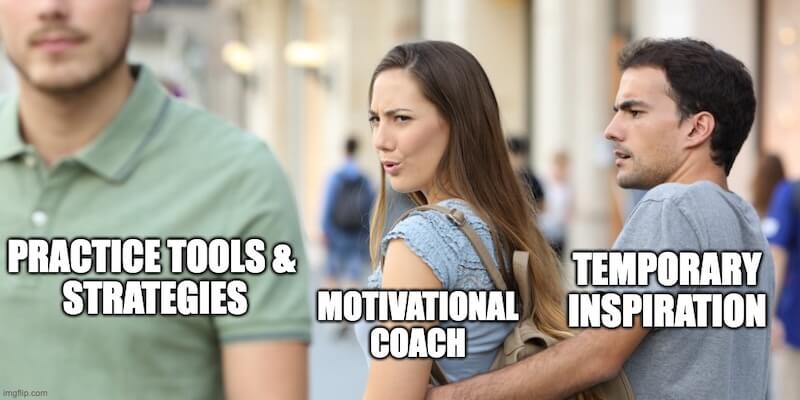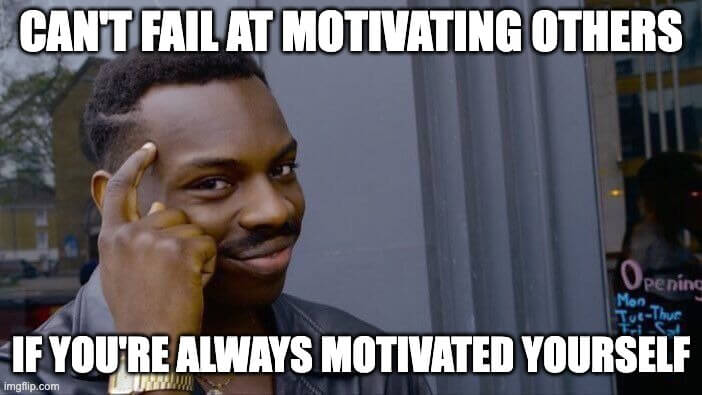Want to be a motivational coach but have no idea where to start? Let’s get into everything you need to know about this awesome career.
What Is a Motivational Coach?
Think of a motivational coach as a personal cheerleader, strategist and accountability partner all in one.

Unlike therapists who work on past issues, motivational coaches help people tap into their inner drive to achieve future goals. They work with clients who feel stuck, unmotivated or unsure of their direction in life.
A motivational coach’s main job is to help clients overcome self doubt and unlock their potential. They don’t just give temporary inspiration — they give practical tools and strategies to help clients stay motivated long term.

Whether it’s career goals, personal transformation or building confidence, motivational coaches guide their clients through the process of lasting change.
Why Become a Motivational Coach?
The reason to become a motivational coach is to make a difference and build a business that lasts.
As a motivational coach you get to see amazing transformations in your clients lives. There’s nothing like seeing someone break through their limitations and achieve what they thought was impossible.
Business Potential
The coaching industry is growing with more people seeking professional help for personal development. As a motivational coach you can:
Have flexible hours
Work from anywhere in the world
Scale your income through multiple revenue streams
Build a business that aligns with your values
How Much Can a Motivational Coach Earn?
Motivational coach earnings can vary greatly depending on experience, location and services offered. On average motivational coaches earn between $50,000 to $100,000 per year. However top motivational coaches with a strong reputation and niche services can earn much more.
According to the International Coach Federation (ICF) Global Coaching Study, the average annual income of coaches worldwide is around $62,500. Note this figure includes all types of coaching not just motivational coaching.
For motivational coaches, those who offer group programs, workshops and digital products can increase their earnings by having multiple income streams. Coaches working with corporate executives or offering niche programs can charge higher fees.
As personal development and motivational coaching demand grows many coaches are finding ways to expand their services and earn more. By delivering big value and continually developing their skills motivational coaches can build a profitable and meaningful career.
Impact
Beyond the business side, motivational coaching is deeply fulfilling.

You’ll help people:
Break free from self limiting beliefs
Find their true potential
Build lasting confidence
Achieve meaningful goals
Motivational Coach vs Life Coach
There’s some overlap between motivational coaching and life coaching but they’re not the same.
Motivational coaches specialise in helping clients find and maintain their inner drive, focusing on motivation, confidence and achievement.
Life coaches take a wider approach, helping clients with various areas of their life, from relationships to career transitions.
Think of it like this: all motivational coaches are life coaches but not all life coaches specialise in motivation.
As a Motivational Coach You’ll Develop Expertise in:
Human motivation
Dive into the psychology of why people take action. By understanding the underlying motivations you can tailor your coaching to each client’s unique needs so they stay engaged and inspired.
Sustainable confidence
Confidence is the key to achieving any goal. You’ll learn to identify and dismantle self doubt and replace it with a solid foundation of self trust that clients can rely on long after your sessions are over.
Creating change momentum
Momentum is key to progress. You’ll learn to spot when clients are stuck and how to re-ignite their drive so they stay on track to their goals.
Achievement strategies
Having strategies is key to goal achievement. You’ll guide clients in setting realistic goals and creating actionable plans so they have the tools to overcome obstacles and celebrate their wins.
Marketing and Sales Strategies
Being a successful motivational coach isn’t just about coaching skills — you need to know how to get and keep clients. The good news is you don’t need complex marketing strategies to get started.
Client Acquisition

Start by building your digital presence.
Create content that showcases your expertise and personality. Share client success stories (with permission) and valuable tips on platforms where your potential clients hang out.
Regular social media posts with actionable advice
Use platforms like Instagram, LinkedIn and Facebook to post motivational content that resonates with your target market.
Share success stories, motivational quotes and tips that encourage engagement and sharing. Use hashtags to increase your reach and connect with potential clients who are looking for motivation and coaching.
Email newsletters with motivation tips
Build an email list by offering a free resource such as an e-book or mini-course in exchange for subscribers.
Use an email service provider to send regular newsletters with motivational insights, success stories and exclusive content to keep your audience inspired and engaged. Personalize your emails to build a stronger connection and encourage readers to reach out for coaching services.
Free workshops or webinars to showcase your expertise

Host online events where you can demonstrate your coaching skills and offer valuable insights into motivation and personal development.
These sessions are an opportunity to connect with potential clients, answer their questions and demonstrate the benefits of working with you as a motivational coach. Consider recording these sessions and putting them on your website as a free resource to attract more leads.
Building real connections in relevant online communities
Join forums, groups and online communities where your target market hangs out. Participate by offering advice, answering questions and sharing your expertise.
Building relationships in these spaces can lead to referrals and new clients who value your input and trust your coaching.
The key is consistency and authenticity. Don’t try to be everywhere at once — pick one or two channels and master them before expanding.
As you build your presence remember to stay true to your values and coaching philosophy so your message resonates with those you want to help.
Online Presence
Your online presence is your digital shopfront.
Keep it simple but professional:
A clean and user-friendly website
Your website is often the first impression potential clients have of your coaching business. Make sure it’s easy to navigate, looks good and clearly communicates your brand and services. Include high quality images, a professional logo and a consistent color scheme that reflects your coaching philosophy.
Share your coaching philosophy and approach
Clearly explain what makes your coaching unique. Explain your methods, the principles you work to and how you help clients achieve their goals. This transparency builds trust and allows potential clients to see if your approach matches their needs.
Clear calls to action
Tell visitors what to do next, whether it’s book a consultation, sign up for a newsletter or join a webinar. Use persuasive language and place these calls to action throughout your site to encourage engagement and conversion.
Testimonials
Display success stories and feedback from past clients. Testimonials are social proof and show the real life results of your coaching. Consider video testimonials or case studies for extra personal touch.
Make it easy for potential clients to get in touch
Offer multiple contact options, a contact form, email and phone number. Make these easy to find and accessible from every page. Quick and open communication channels can make all the difference in converting leads into clients.
Remember your website doesn’t have to be perfect — it just has to communicate who you are and how you can help.
Update your content regularly with new services, client success stories and industry news.
Also consider adding a blog or resource section to share valuable content and position yourself as an authority in the motivational coaching space. This ongoing content will drive traffic to your site and boost your search engine rankings so potential clients can find you.
Systems and Structures
Running a coaching practice is more than just coaching skills. You need systems and processes to keep everything ticking over.
Start with the basics:
Set up a scheduling system
Client intake forms and agreements
Professional liability insurance
Progress tracking system
As you grow you can refine these systems. The goal is to spend more time coaching and less time on admin.
Certification Programs
Certification isn’t required to be a motivational coach but it adds credibility and training. The International Coach Federation (ICF) is the industry standard for coaching certification.
Top Motivation Coaching Certification Programs:
1/ Center for Progressive Recovery — Progressive Motivation Coaching
The Progressive Motivation Coach Training (PMCT) program is for recovery coaches, incorporating evidence-based motivational change strategies.
Mode of Delivery: Online with pre-recorded lectures and virtual calls
2/ Institute for Professional Excellence in Coaching (iPEC)
Although not a dedicated motivational coaching certification program, iPEC’s certification program is ICF accredited. This program is known for it’s comprehensive training and energy-based coaching techniques, iPEC provides a solid foundation in personal dynamics and energy leadership.
Mode of Delivery: In-person and online
3/ GRCMC Motivation Coaching
This program, offered by Get Results Coach Academy on Udemy, is on the “Get Results Motivation Coaching (GRCMC) System.” It provides a framework for assessing and addressing clients’ obstacles to create positive change.
Mode of Delivery: Online, self-paced
Business Scaling
Once you have your coaching practice up and running you can explore ways to increase your income and impact more people. The key is to create multiple income streams while maintaining the quality of your service.
Group Programs
Group coaching is a great way to help more people while maximizing your time. Consider:
6-8 week motivation bootcamps
Mastermind groups for specific goals
Monthly group coaching calls
Accountability circles
The beauty of group programs is they’re often more affordable for clients and more profitable for you.
Digital Products
Package your expertise and create passive income streams:
Self-paced motivation courses
Downloadable workbooks and journals
Guided meditation or visualization recordings
Mobile apps for goal tracking
Start with one product and perfect it before moving on to the next. Your digital products should complement not replace your coaching services.
Workshop Series
In-person or virtual workshops can:
Attract new clients
Provide additional value to existing clients
Establish you as an expert
Create new income streams
Consider partnering with companies or organizations to deliver corporate motivation workshops – this can be very profitable.
Community Building
Create a space for your clients to connect:
Monthly community calls
Client-only events (online and/or offline)
A community adds value to your coaching programs and helps with client retention.
30-Day Timeline to Become a Motivational Coach
Day 1-5: Research and Planning
Knowing Your Role: Read articles, watch videos, and talk to a few coaches.
Set Your Intentions: Why do you want to become a motivational coach? Write down your goals and what you want to achieve.
Day 6-10: Training and Certification
Research Certification Programs: Look into programs like the International Coach Federation (ICF) or others mentioned above. Choose one that fits your budget, schedule, and workload.
Enroll in a Program: Sign up for a certification program that covers the basics of motivational coaching.
Day 11-15: Skill Building
Learn Coaching Techniques: Human motivation, confidence and momentum for change.
Coach: Practice with friends or family. This will help you build confidence and get your approach.
Day 16-20: Build Your Brand
Online Presence: Set up a simple website and social media profiles. Share your journey and motivational tips to attract clients.
Have an Online Presence: Create a social media profile. Share useful tips that your target audience will benefit from. Don’t just hard-sell.
Network: Connect with other like-minded coaches from other coaching communities and forums. Share and learn from one another.
Day 21-25: Business Setup
Business Organization: Set up a scheduling system, client intake forms and payment processes.
Legal and Financial: Consider getting professional indemnity insurance and a business bank account.
Day 26-30: Launch and Scale
Coach: Just start coaching a few clients. Give them free sessions if need be. Focus on solving their problems and helping them so that you can get valuable testimonials.
Ask for Feedback: Always try to improve by asking for constructive feedback from your clients. Ask them what they like and didn’t like.
Grow: Think about how you can scale your coaching business — group sessions for leverage and digital products for semi-passive income.
As you create digital coaching materials, choose a secure platform with fair fees – learn about platform security before deciding where to sell your content.
Follow this 30-day plan to get started. No more “what to do” excuses. Remember, only action takers are rewarded. No action = no results.
Start where you are. Use what you have. And take one small step at a time.
TL;DR
While everyone loves money… your success as a motivational coach isn’t just measured by your income. It’s also about the impact you make on your clients’ lives and businesses.

Becoming a successful motivational coach may seem daunting but with the right approach and commitment you can build a business that makes a real impact on people’s lives.
Start where you are, use what you have and take one step at a time. Your future clients are waiting for your unique perspective and support.
FAQs
1. What qualifications do I need
While qualifications aren’t necessary, getting certified through a recognized program (ICF accredited) will help with credibility and skills. Many coaches also benefit from ongoing professional development and specialized training in motivational coaching.
2. How do motivational coaches differ from motivational speakers?
Motivational coaches work one to one or in small groups to provide individual support and guidance to help clients achieve specific results. Motivational speakers speak to larger audiences and deliver inspirational messages without the coaching process.
3. Can I start a coaching business part-time?
Yes many coaches start their business as a side hustle and then transition to full time as they build their client base and confidence. Starting part time allows you to develop your skills and establish your brand without the pressure of immediate financial dependence.
4. How do I set goals with my clients?
Work with clients to identify their core motivations and break down bigger goals into smaller steps. Get them to set SMART goals (Specific, Measurable, Achievable, Relevant, Time bound) and review progress regularly to adjust plans as needed.
5. What tools do motivational coaches use to help clients stay motivated?
Motivational coaches use a range of tools including action plans, accountability check ins, visualization techniques and motivational exercises. These tools help clients stay focused, track progress and overcome obstacles to achieve their goals.
Related
- ThriveCart vs Gumroad: the recurring revenue trap (2026)
- Where to Buy Digital Products to Resell: 6 Top Places in 2026 (+ a glaring problem)
- SamCart vs Gumroad: who actually owns your customers? (2026)
- Is Gumroad Safe in 2026? Uncovering the Hidden Pros and Cons
- Payhip vs Podia: The Recurring Income Hostage (2026)
- Payhip vs SamCart: The Recurring Revenue Handcuffs (2026)
- SamCart vs ClickFunnels: The Recurring Revenue Hostage (2026)
- SendOwl vs ThriveCart: Which has a hidden trap in 2026?
- SendOwl vs SamCart: The Recurring Revenue Jail (2026)
- ThriveCart vs ClickFunnels: When more features hurt (2026)
- SendOwl vs Payhip: The “You-Leave-You-Lose” Model (2026)
- SamCart vs Kajabi: The Income Hostage Trap (2026)
- Sellfy vs Payhip: The Recurring Revenue Prison (2026)
- Podia vs Gumroad: The Recurring Revenue Handcuffs (2026)
- SendOwl vs Gumroad: The Recurring Revenue Black Hole (2026)
